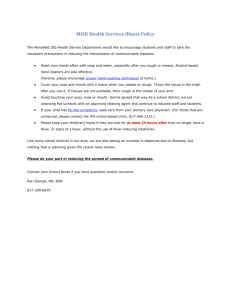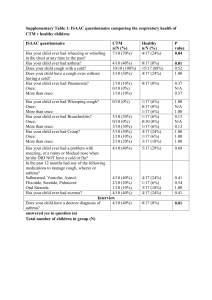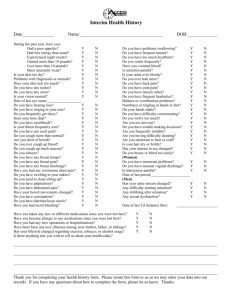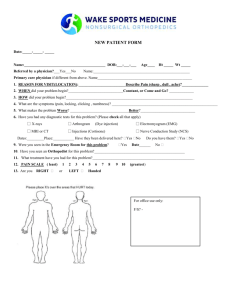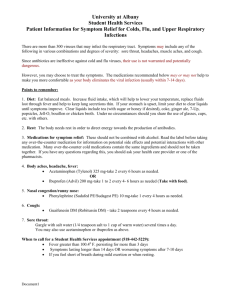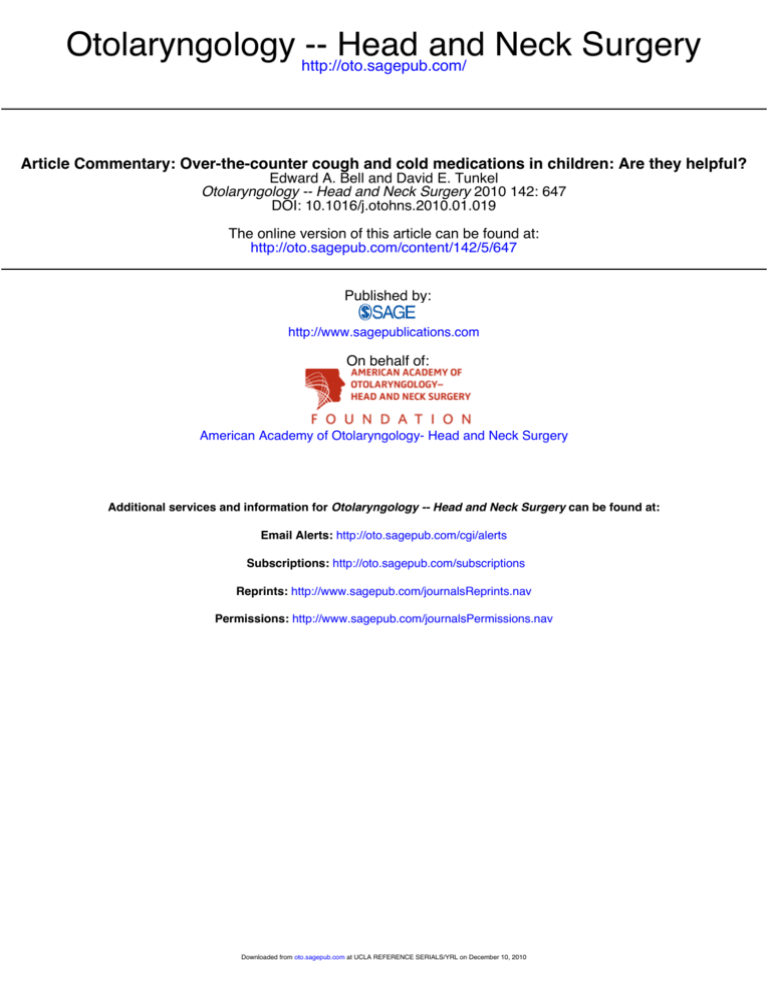
Otolaryngology http://oto.sagepub.com/
-- Head and Neck Surgery
Article Commentary: Over-the-counter cough and cold medications in children: Are they helpful?
Edward A. Bell and David E. Tunkel
Otolaryngology -- Head and Neck Surgery 2010 142: 647
DOI: 10.1016/j.otohns.2010.01.019
The online version of this article can be found at:
http://oto.sagepub.com/content/142/5/647
Published by:
http://www.sagepublications.com
On behalf of:
American Academy of Otolaryngology- Head and Neck Surgery
Additional services and information for Otolaryngology -- Head and Neck Surgery can be found at:
Email Alerts: http://oto.sagepub.com/cgi/alerts
Subscriptions: http://oto.sagepub.com/subscriptions
Reprints: http://www.sagepub.com/journalsReprints.nav
Permissions: http://www.sagepub.com/journalsPermissions.nav
Downloaded from oto.sagepub.com at UCLA REFERENCE SERIALS/YRL on December 10, 2010
Otolaryngology–Head and Neck Surgery (2010) 142, 647-650
COMMENTARY
Over-the-counter cough and cold medications in
children: Are they helpful?
Edward A. Bell, PharmD, BCPS, and David E. Tunkel, MD, Des Moines, IA;
and Baltimore, MD
Sponsorships or competing interests that may be relevant to content are disclosed at the end of this article.
ABSTRACT
Over-the-counter cough/cold medications are commonly used in
children. Recent recommendations by the Food and Drug Administration and changes to product labeling by cough/cold product
manufacturers have reduced use of these products in children
younger than four years of age. Data from controlled clinical trials
of cough/cold product ingredients do not support their efficacy in
young children. Serious adverse effects have been reported from
cough/cold product use in infants and children, which largely
result from inappropriate use by caregivers. Conservative therapies, including nasal suctioning, humidification, and nasal saline,
should be recommended over cough/cold product use for infants
and children. Otolaryngologists should educate caregivers of children on the safe and effective use of these products and therapies.
© 2010 American Academy of Otolaryngology–Head and Neck
Surgery Foundation. All rights reserved.
O
ver-the-counter (OTC) cough/cold medications are
commonly used in young children to provide relief of
symptoms of upper respiratory tract infections, including
acute otitis media, the common cold, and rhinosinusitis.
There is a disparity, however, between how commonly
these products are used and evidence for their efficacy. OTC
pediatric cough/cold products have recently received increased attention in both the lay and medical literature, and
in 2008 the Food and Drug Administration (FDA) issued
new recommendations on the appropriate use of OTC
cough/cold products for young children. Primary pediatric
medical care providers have recognized major issues with
the use of these medications. The otolaryngologist will see
children, physician-referred or self-referred, for treatment of
refractory upper respiratory tract infections. Some of these
children will have been treated with cold/cough medications, and some of the parents will request such medications.
Children in the United States are commonly given OTC
products containing ingredients for symptoms of and conditions related to respiratory tract infections (Table 1). The
Sloan Survey, a random digit-dial telephone survey of medication use in the previous seven days, reported on prescription and OTC medication use of 2857 children younger than
12 years of age between 1998 and 2007 in each of the 48
contiguous states.1 Among the most commonly used medications were acetaminophen/pseudoephedrine, cold/fever
medication (unspecified), dextromethorphan/pseudoephedrine, and cough medication (unspecified). These medications were used more commonly in the zero- to 23-month
age group, although they, or similar class agents, were also
used in the two- to five-year and six- to 11-year age groups.
Dextromethorphan was among the top six most commonly
used active-ingredient medications in all three age groups.
The number of children given OTC medications was more
than twice that of children given prescription medications in
a given week. These data, along with data from other surveys, demonstrate that OTC cough/cold products are commonly used in children.
Recent Changes in OTC Product Availability
and Regulation
The past several years have seen significant changes in the
availability and regulation of pediatric OTC cough/cold
products. In early 2007 a citizen petition was submitted by
various health care practitioners to the FDA requesting the
agency to publicly state that OTC antitussive, expectorant,
nasal decongestant, antihistamine, and combination cough/
cold products are not safe and effective for children younger
than six years of age. Sharfstein et al2 called for cessation of
the use of these drugs in children, noting that all six randomized controlled trials of cough and cold medications for
children younger than 12 years of age performed since 1985
showed no advantages over placebo. They also noted that
these medications were responsible for 750,000 calls to
poison control centers over the decade, and that the FDA
was investigating the deaths of 123 children associated with
such medications.
In October 2007, the Consumer Healthcare Products Association, on behalf of manufacturers of pediatric OTC
Received January 12, 2010; accepted January 19, 2010.
0194-5998/$36.00 © 2010 American Academy of Otolaryngology–Head and Neck Surgery Foundation. All rights reserved.
doi:10.1016/j.otohns.2010.01.019
Downloaded from oto.sagepub.com at UCLA REFERENCE SERIALS/YRL on December 10, 2010
648
Otolaryngology–Head and Neck Surgery, Vol 142, No 5, May 2010
Table 1
Examples of pediatric cough/cold products available over the counter
Product and dosage form
Children’s Dimetapp DM Cold and Cough (elixir)
Children’s Tylenol Plus Flu (liquid)
Children’s Tylenol Plus Multi-Symptom Cold
(suspension)
Children’s Vicks NyQuil Cold/Cough Relief (liquid)
Pediacare NightRest Cough and Cold Liquid (liquid)
Robitussin Cough, Cold and Flu Nighttime (liquid)
cough/cold products, voluntarily withdrew 14 pediatric
cough/cold products intended for use in children younger
than two years of age. In 2008, the FDA issued a public
health advisory recommending that OTC cough/cold products not be used in children younger than two years of age,
unless specifically instructed by a health care provider. In
late 2008, the Consumer Healthcare Products Association
announced that manufacturers were voluntarily changing
OTC pediatric cough/cold product labeling to state, “Do not
use in children under the age of four years.” The FDA is
continuing to review safety and efficacy data for cough/cold
products in children two to 11 years of age, and the agency
may issue new recommendations on the use of these products in the future.
The regulatory history of OTC cough/cold product ingredients is interesting to briefly review. The active ingredients found in OTC cough/cold products have been “generally recognized as safe and effective.” However, since the
1970s, the FDA has been aware that scientific evidence
describing the safety and effectiveness of cough/cold product ingredients in young children is limited. Because these
products were commonly used in children, dosage recommendations were developed. In 1974, a panel of seven
physicians recommended the following doses for cough/
cold products in children: younger than two years, dose
established by the physician (i.e., “consult a physician”);
two to five years, one fourth of adult dose; and six to 11
years, one half of adult dose. Body weights used for this
dosing rationale included an average adult weight of 60 kg.
Efficacy studies had not been required for pediatric OTC
products, because ingredient efficacy was extrapolated from
the adult population.
This assumption does not consider that the pathophysiology of the common cold and other respiratory tract conditions often differ in children compared with adults, including alterations in sinus development, airway size, respiratory
muscle and chest wall size, and clinical presentation. Additionally, the cited pediatric dosing recommendations do not
account for pharmacokinetic alterations in drug disposition
in infants and children as compared with adults, which have
been shown for several cough/cold product active ingredients. Parents can easily make dosing errors, and inadvertent
Active ingredients
Pseudoephedrine, brompheniramine, dextromethorphan
Phenylephrine, chlorpheniramine, dextromethorphan,
acetaminophen
Phenylephrine, chlorpheniramine, dextromethorphan,
acetaminophen
Pseudoephedrine, chlorpheniramine, dextromethorphan
Pseudoephedrine, chlorpheniramine, dextromethorphan
Phenylephrine, chlorpheniramine, dextromethorphan,
acetaminophen
overdoses may occur when several OTC “combination”
products that share a common component are administered
simultaneously. In summary, efficacy of these medications
in young children has not been demonstrated in clinical
trials, and the combination of extrapolation of dosing from
adult data and the potential for dosing errors by parents can
be dangerous.3
Cough/Cold Product Ingredient Efficacy and
Safety
The clinical decision process in the use of any medication
includes an assessment of benefit and risk. Scientific data
describing the efficacy of cough/cold product ingredients in
young children are essentially nonexistent. In a review of
clinical trials of OTC cough/cold medications used for treatment of the common cold published between 1950 and
1991, few studies in young children were identified, and
none demonstrated efficacy. Some efficacy was shown for
adolescents, and nasal symptoms were shown to improve in
adults.4 In another controlled trial, an oral antihistamine/
decongestant product was not shown to provide any benefit
over placebo in reducing symptoms of upper respiratory
tract infection (other than providing sedation) in children
aged six months to five years.5
Antitussives, mainly dextromethorphan, are found in
many commonly used OTC cough/cold products.1 Are there
data to document efficacy of antitussive ingredients in children? The American Academy of Pediatrics Committee on
Drugs published recommendations on the use of cough
products containing dextromethorphan or codeine in children in 1997.6 They concluded that no well-controlled studies exist to support the antitussive effects of these agents in
children, that currently recommended dosages are not scientifically based, and that significant adverse effects are
possible. A recently published clinical trial in children suggests that honey may be a clinically effective antitussive.
Researchers compared a single nocturnal dose of buckwheat
honey with dextromethorphan and no treatment in children
with upper respiratory infection and cough; they found that
children receiving honey demonstrated the greatest improvement.7
Downloaded from oto.sagepub.com at UCLA REFERENCE SERIALS/YRL on December 10, 2010
Bell and Tunkel
Over-the-counter cough and cold medications in . . .
Returning to the risk/benefit assessment for pediatric
OTC cough/cold agents, there is evidence of potential for
significant harm, including death, when products with these
agents are used. Several factors are believed to contribute to
the potential for harm from the use of pediatric OTC cough/
cold products, including administration of excessive doses,
use of inappropriate dose-measurement devices, simultaneous use of several products (e.g., without knowledge of
product ingredients), or use of adult product formulations.
The administration of small doses, the potential for lack of
efficacy (i.e., more is better), and OTC product availability
without health care provider consultation additionally contribute to the potential for adverse effects when these products are given to children. Safety data available from the
FDA on adverse effects from cough/cold ingredient use in
children younger than six years of age over a 37-year period
(1969-2006) include 54 fatal cases potentially attributable to
decongestant agents, and 69 fatal cases potentially attributable to antihistamine agents. The majority of these cases
occurred in children younger than two years of age, and
many cases resulted from excessive dosing. The Centers for
Disease Control and Prevention published a report of three
infant deaths attributable to cough/cold product use.8 All
infants were six months of age or younger, and their deaths
were determined by medical examiners or coroners to be
due to cough/cold medication administration. Products that
were likely given to these infants included a prescription
product (pseudoephedrine/carbinoxamine/dextromethorphan)
given to two infants, and an OTC product (pseudoephedrine/
acetaminophen) given to the third infant. One infant was given
an OTC product (pseudoephedrine/acetaminophen) in addition
to a prescription cough/cold product. All three infants had
high pseudoephedrine levels in postmortem blood samples.
Since 2006, the FDA has restricted the availability of OTC
products containing pseudoephedrine because of the use of
this decongestant in the illegal manufacture of methamphetamine. Other case reports of death or significant harm in
children from the use of OTC cough/cold products have also
been published.
Antihistamine/decongestant medications have been evaluated for other conditions familiar to otolaryngologists.
Data from several controlled trials of systemic antihistamine/decongestant use in children with otitis media with
effusion have shown these medications offer no benefit, and
few otolaryngologists who routinely treat children use these
medications for treatment of otitis media in children without
suspected or documented allergy. Convincing data do not exist
to support the use of antihistamine-decongestants in the treatment of children with acute or chronic rhinosinusitis.
Nasal saline solutions can be given safely to infants and
children to help relieve symptoms of upper respiratory tract
infection, and are recommended by the American Academy
of Pediatrics over OTC cough/cold products. OTC nasal
saline products are available as solutions, sprays, and irrigations used with a neti pot or other rinse device. In a recent
assessment of the use of nasal saline irrigation for chronic
649
rhinosinusitis symptoms, the authors of a Cochrane review
concluded that saline irrigations are an effective treatment
for symptoms of chronic rhinosinusitis, although not as
beneficial as the use of an intranasal corticosteroid.9 A trial
of nasal irrigation with isotonic saline showed improved
symptoms of acute upper respiratory tract infection in children.10 This treatment also reduced the recurrence of symptoms as well as the need for additional supportive medications, such as decongestants and antipyretics. Wang et al11
studied nasal irrigation as part of the treatment of children
with acute sinusitis and noted improvements in quality of
life assessments, symptom scores, and measures of nasal
expiratory flow, although radiographs did not change significantly.
Conclusion
OTC cough/cold products are commonly used in the pediatric population because they are heavily advertised to the
public and are readily available. Parents may administer
these products to children with good intentions, as these
medications are widely used to treat adults with upper
respiratory conditions. Data supporting their efficacy, however, do not exist. Evidence of the potential for significant
harm from the use of these products in young children does
exist. Recent regulatory changes have altered the age indications on the labels of OTC cough/cold products, and these
may change again in the future. Conservative measures,
such as humidification, analgesia, and irrigations, should be
considered as adjunctive treatment of upper respiratory infections, including otitis media and sinusitis, acute or
chronic, that otolaryngologists see in children. Controversy
over the use of OTC cold/cough medications for children
emphasizes the need to perform controlled studies dedicated
to medication efficacy in children. Otolaryngologists have
an opportunity to educate patients and parents about this
issue.
Author Information
From Drake University College of Pharmacy and Health Sciences, Blank
Children’s Hospital and Clinics (Dr. Bell), Des Moines, IA; and Pediatric
Otolaryngology, Johns Hopkins Medical Institutions (Dr. Tunkel), Baltimore, MD.
Corresponding author: David E. Tunkel, MD, Johns Hopkins Outpatient
Center, Rm. 6161B, 601 North Caroline St., Baltimore, MD 21287.
E-mail address: dtunkel@jhmi.edu.
Author Contributions
Edward A. Bell, conception and design, research, drafting and revision of
article; David E. Tunkel, conception and design, research, drafting and
revision of article.
Disclosures
Competing interests: David E. Tunkel, consultant: Medtronic.
Sponsorships: None.
Downloaded from oto.sagepub.com at UCLA REFERENCE SERIALS/YRL on December 10, 2010
650
Otolaryngology–Head and Neck Surgery, Vol 142, No 5, May 2010
References
1. Vernacchio L, Kelly JP, Kaufman DW, et al. Medication use among
children !12 years of age in the United States: results from the Sloan
Survey. Pediatrics 2009;124:446 –54.
2. Sharfstein JM, North M, Serwint JR. Over the counter but no longer
under the radar – pediatric cough and cold medications. N Engl J Med
2007;357:2321– 4.
3. Dolansky G, Rieder M. What is the evidence for the safety and efficacy
of over-the-counter cough and cold preparations for children younger
than 6 years of age? Paediatr Child Health 2008;13:125–7.
4. Smith MBH, Feldman W. Over-the-counter cold medications: a critical review of clinical trials between 1950 and 1991. JAMA 1993;269:
2258 – 63.
5. Clemens CJ, Taylor JA, Almquist JR, et al. Is an antihistaminedecongestant combination effective in temporarily relieving symptoms of the common cold in preschool children? J Pediatr 1997;
130:463– 6.
6. Committee on Drugs, American Academy of Pediatrics. Use of codeine- and dextromethorphan-containing cough remedies in children.
Pediatrics 1997;99:918 –20.
7. Paul IA, Beiler J, McMonagel A, et al. Effect of honey, dextromethorphan, and no treatment on nocturnal cough and sleep quality for coughing
children and their parents. Arch Pediatr Adol Med 2007;161:1140 – 6.
8. Centers for Disease Control. Infant deaths associated with cough and
cold medications – two states, 2005. MMWR Morb Mortal Wkly Rep
2007;56(01):1– 4.
9. Harvey R, Hannan SA, Badia L, et al. Nasal saline irrigations for the
treatment of chronic rhinosinusitis. Cochrane Database Syst Rev 2007;
3:CD006394.
10. Slapak I, Skoupá J, Strnad P, et al. Efficacy of isotonic nasal wash
(seawater) in the treatment and prevention of rhinitis in children. Arch
Otolaryngol Head Neck Surg 2008;134:67–74.
11. Wang YH, Yang CP, Ku MS, et al. Efficacy of nasal irrigation in the
treatment of acute sinusitis in children. Intl J Ped Otorhinolaryngol
2009;73:1696 –701.
Downloaded from oto.sagepub.com at UCLA REFERENCE SERIALS/YRL on December 10, 2010

